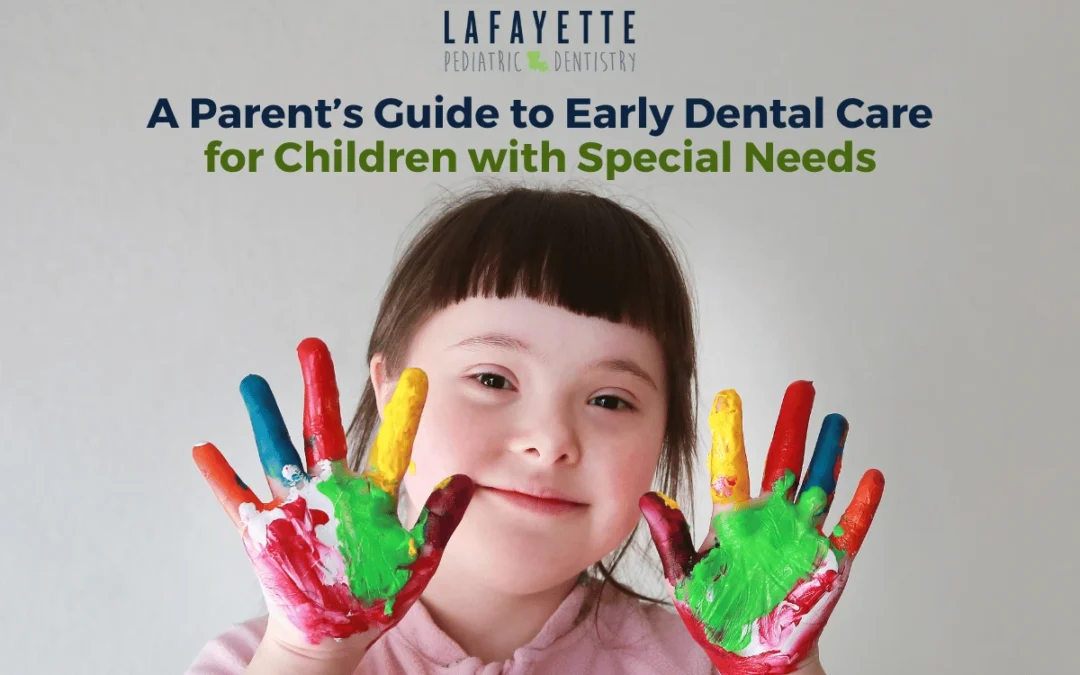As we recognize March as Developmental Disabilities Awareness Month, we want to take this opportunity to highlight the importance of starting your child’s dental care early, especially if they have special needs.
Many parents don’t realize that preparing for their child’s dental health can begin even before their child is born, particularly if they receive a prenatal diagnosis. This diagnosis can feel overwhelming, and with so much to plan for, dental care is often overlooked.
But, early prevention is essential as it lays the groundwork for a healthier future and gives children the best chance to lead fulfilling lives and reach their full potential.
Here, we’ll share advice on how to start preparing for your child’s best life, even before birth, after receiving a diagnosis.
Before Your Baby is Born
Understand the Specific Disability and Its Dental Implications
Each developmental disability can present unique oral health challenges that require special attention. While some disabilities only become apparent after birth or in early childhood, many can be detected before the baby is born through prenatal screenings.
Understanding these challenges early can help you take a proactive approach. For example:
- Children with Down syndrome often have delayed tooth eruption and may have smaller teeth or missing teeth
- Children with autism may have sensory issues that make the oral care routine more difficult. Bright lights, loud noises, and unfamiliar textures can be overwhelming for them.
- Children with cerebral palsy and severe intellectual disabilities often experience bruxism (teeth grinding).
Read more: Dental Care for Children with Special Needs: What You Need to Know
Join Support Groups for Parents
You can also look into joining support groups for parents with children with the same condition. These groups can be invaluable for learning about challenges, including dental ones, from those who’ve been through them.
While they’re great for emotional support, always check with healthcare professionals for medical advice since every child is unique.
Choose a Dentist with Special Needs Experience
One of the best things you can do is find a pediatric dentist with experience in special needs care before your baby is born so you can set up those first visits early.
Having a dental team that understands your child’s specific needs helps create a much more positive experience right from the start.
Read more: How Our Pediatric Dental Team Creates a Supportive Environment for Special Needs Children
Oral Care from Day One
Start Oral Care Early, Both at Home and in a Dental Home
Children with disabilities are more prone to dental issues, so it’s important to start oral care early on. In particular, oral sensory aversion is common among persons with special needs. Understandably, this aversion tends to make parents shy away from doing thorough and regular brushing at home.
As brushing becomes more and more infrequent at home, oral sensory aversion becomes more severe. The key is to work with occupational therapists along with your pediatric dentist as early as possible (starting age 1) and with regular frequency to minimize worsening of oral aversion.
We work with many patients whose therapists incorporate toothbrushing into their sessions to make cleanings less frightening or aversive.
When a child with special needs starts out knowing toothbrushing as a part of their daily routine, oral health outcomes are always better.
So establish a dental home for your child early. Try to visit a pediatric dentist who specializes in special needs by 1 year of age or when the first tooth appears, whichever comes first.
These early visits help your child get comfortable at a dentist and catch potential issues before they become bigger problems.
Your pediatric dentist can also refer you to specialists if they notice other conditions that may impact your child’s dental health and overall well-being.
Schedule regular dental visits as recommended since these children are more prone to dental health issues. What might be a small cavity in another child could progress more quickly in a child with certain conditions or taking certain medications.
Help Your Child Get Used to Daily Oral Care
Establishing daily oral care routines early on helps your child become accustomed to good hygiene habits.
Consistency is key! Children with special needs often thrive on routine, so making brushing a non-negotiable part of the morning and evening can be especially helpful.
Use encouragement and rewards to motivate cooperation during brushing and dental appointments. Find what works for your child. Maybe it’s a special song during brushing time, a favorite stuffed animal that “helps” with brushing, or a small reward afterwards.
Experimenting with different toothbrushes and toothpastes can also make the dental routine less stressful for both you and your child.
Check out our blog for more tips on making at-home dental care fun for children with special needs.
Looking Ahead
Your child’s oral health affects their overall health, so parents need to stay on top of it. Know that your pediatric dentist is there to work with you to find the best care plan for your child.
We understand that caring for a child with special needs can bring its own set of challenges, and we’re here to help ease any anxiety or uncertainty you may feel.
Our dental practice is committed to providing compassionate, high-quality care to make sure every visit is a positive experience.
We proudly offer dental care for children with special needs in Lafayette, Youngsville, Breaux Bridge, Carencro, and nearby areas.
If you’d like to learn more about how our special needs dentistry can support your child’s oral health, please don’t hesitate to reach out to us!
